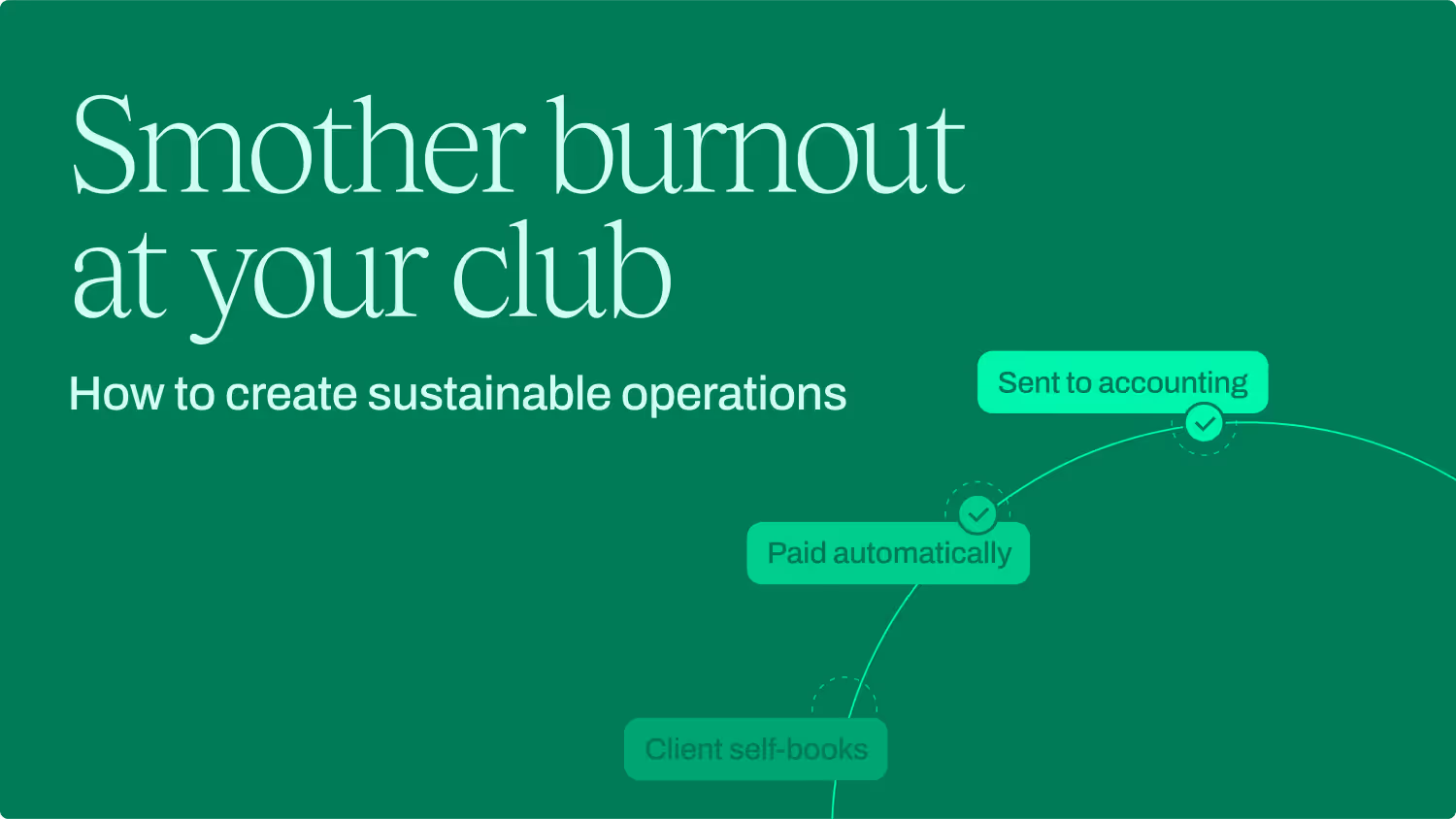If you’re running a club, you’re probably either figuring out how to avoid burnout—or you’re already there. Either way, you’re not alone. According to Strategic Marketing & Operations Manager, Ariana Kane McCormack of Kingsbury Club Medfield, “unrelenting schedules, financial insecurity, and passion-driven pressure” are to blame, and require a holistic approach to protect both mental health and passion for the game.
Follow the tips below to dodge burnout and reclaim hours that are better spent doing what you love.
Before we share expert-backed solutions, it’s helpful to identify 1) what’s fueling stress for current club owners, and 2) what steps new managers can take to avoid it from day one.
For current club owners: Identify the root cause of your burnout
Before we can fix it, we need to identify the cause. Think back to the last time you felt like you couldn’t handle your workload, and go on to answer these three questions.
- How many tasks were you responsible for on a daily basis?
- What tasks were taking up the most time out of your day?
- If you could’ve fixed one thing to instantly reduce burnout, what would it be?
Your answers should help you pinpoint the source of your burnout, and guide you toward the best way to tackle it.
For new club owners: Strategize before execution
If you’re just starting out, it’s critical to create a business strategy that’s sustainable long term to help you achieve your goals. Burnout affects more than the quality of your life—it can even jeopardize your business. How? You and your staff are the backbone of daily operations, and if you’re too drained to handle day-to-day tasks due to burnout, productivity drops and business follows.
Nip it in the bud before it happens. Before starting your business plan, think about your position within the organization—if you’re the owner, you should be responsible for one thing: growth. Operational and financial aspects of the business, management decisions, and sales efforts should roll up to you, and should be aligned with your plan for growth.
Note: You do not need to have team members dedicated to each area of the business. In fact, you’ll quickly learn below that your club can be managed hands-off if you opt for the right tools.
Once your business segments are defined, the next step is making strategic decisions to help each one succeed. As mentioned before, success is only possible with a well-managed workload. To help, we’ve mapped out expert-backed tips to help you create a sustainable operating model—and, in turn, avoid burnout.
Create sustainable operations to smother burnout
In her article, Behind the Baseline, McCormack expands on why burnout happens in racquet sports, and offers several solutions to the problem.
Set boundaries through cancellation policies
Highlighting that demanding schedules contribute to burnout, she writes, “Coaches and staff often work 6–7 days a week, sometimes 12+ hours a day, juggling private lessons, clinics, tournaments, and administrative responsibilities.”
The solution? Boundaries and cancellation policies. By outlining cancellation periods upfront, you’ll know in advance whether your customers will attend sessions, allowing you to regain control over your schedule.
Tip: Choose a booking software with flexible lock-in policies so that you’re in full control of when clients can cancel.
Let software do the heavy-lifting
The right tool for your facility is the tool that automatically handles the tasks that take up most of your time. McCormack states, “Pros are expected to manage scheduling, communication, billing, and event logistics—often without the tools or experience needed to succeed.” With these added responsibilities, clubs should create a centralized system that automatically handles administrative tasks, from bookings and payments to external communications, so that the tasks don’t fall on team members.
Types of software to explore:
- Project management tools: Help delegate, track, and manage internal tasks to keep operations running smoothly.
- Booking software: Make booking a seamless experience for your customers, and yourself, so there’s no more scheduling back-and-forth.
- Payment processors: Facilitate electronic transactions between customers and businesses.
- Accounting programs: Keep track of all expenses, manage tax documents, and forecast budgets all in one place.
- Customer relationship management platforms (CRMs): Store your database of contacts, send emails, and manage social media all in one place.
You might now be wondering, how is it centralized if I still need to juggle all these tools? The key is by choosing software that supports integrations. Each platform you use for your club should connect seamlessly, so that data from one automatically flows into another.
Here’s what this could look like in action: You manage transactions in your payment processor, but you need these transactions to also appear in your accounting software. To faciliate the data exchange without any manual effort, both platforms must have integration functionality.
Since team members are focused on their role within your organization, clubs should choose a centralized software system to handle administrative jobs, like booking, communications, and payments; so they spend less time tied to their desks and more time doing the work they love.
Prioritize playing for fun
McCormack also emphasizes the importance of simply playing for fun. “When every hour of your day is centered around the sport, and there’s no time for your connection to it, your drive starts to fade—and so does your sense of purpose.” Too often, what used to be your hobby simply turns into work, and loses its spark. If you’re managing a club, make time for your team to get together for a session or two, to create friendly competition and reignite their passion for the activity.
Delegate tasks
It may be hard to let go of the reins at first, but you’re actually doing yourself a disservice by overworking and taking on too many tasks. In fact, studies show that productivity sharply declines when people work more than 50 hours per week. Wherever possible, hand-off your tasks to someone else.
Here’s what this could look like in action: You may want to maintain an active social media presence to get the word out about your club, but you don’t have the time to do it yourself. Why not try delegating the work to an intern? They get the experience, and you get the time back.
Prioritize rest
Even though it may not feel like it, rest productive. After all, you’re only human, and there’s a limit to how much you can juggle. Give yourself permission to take breaks, say no, and set boundaries, because the only way to truly give it your all is by knowing your limits.
To learn more about how AllBooked can help you tackle burnout at your club, click the button below.








